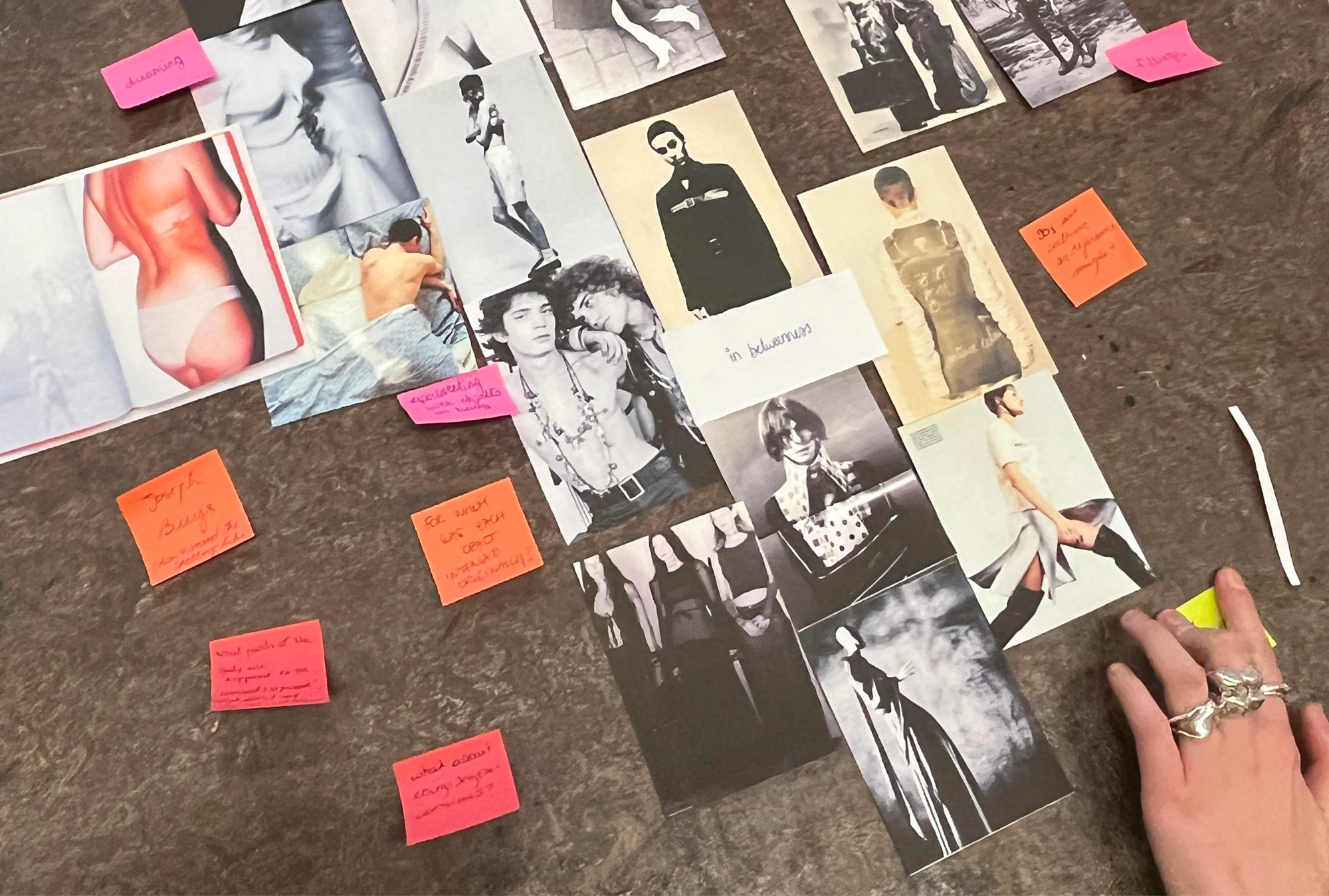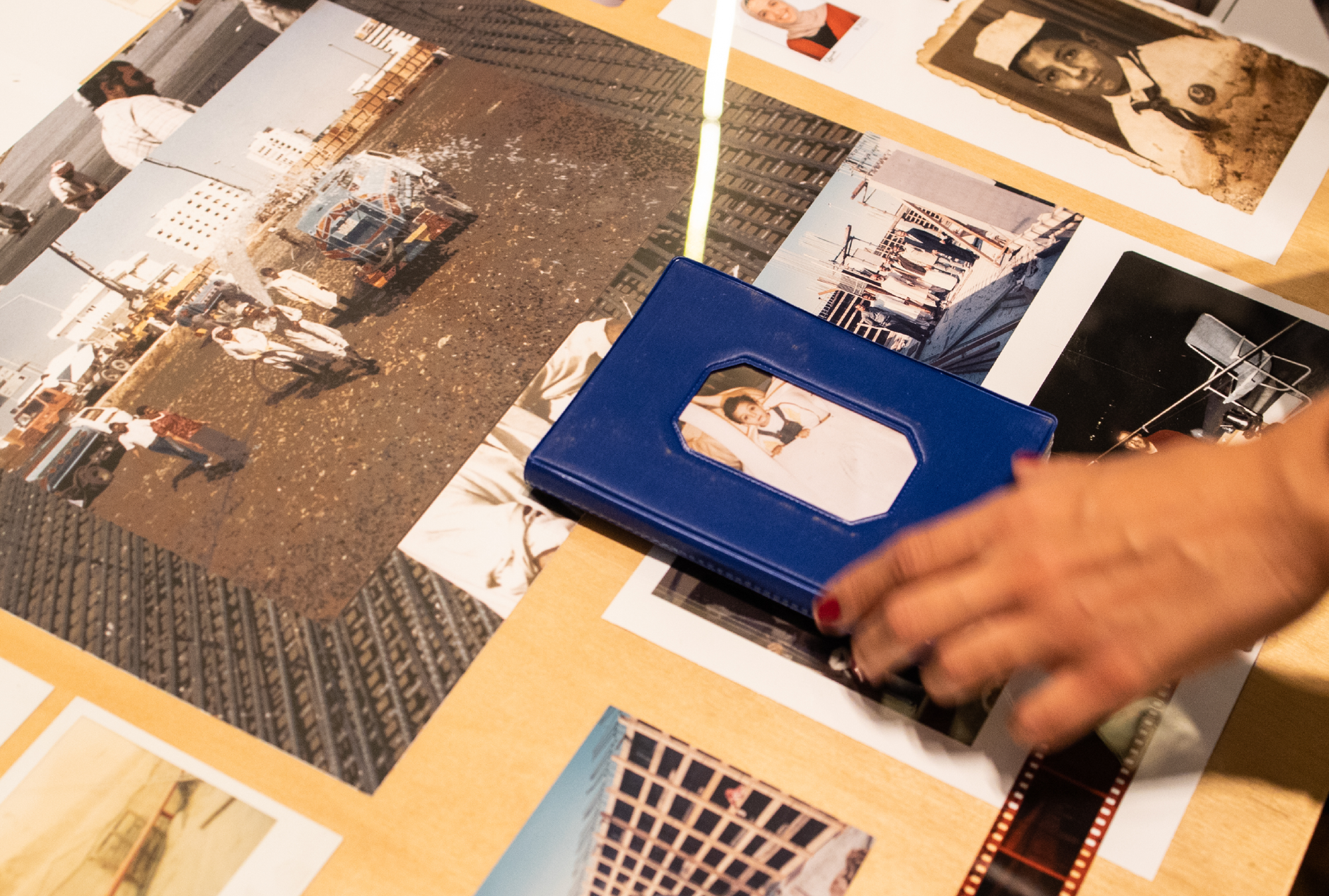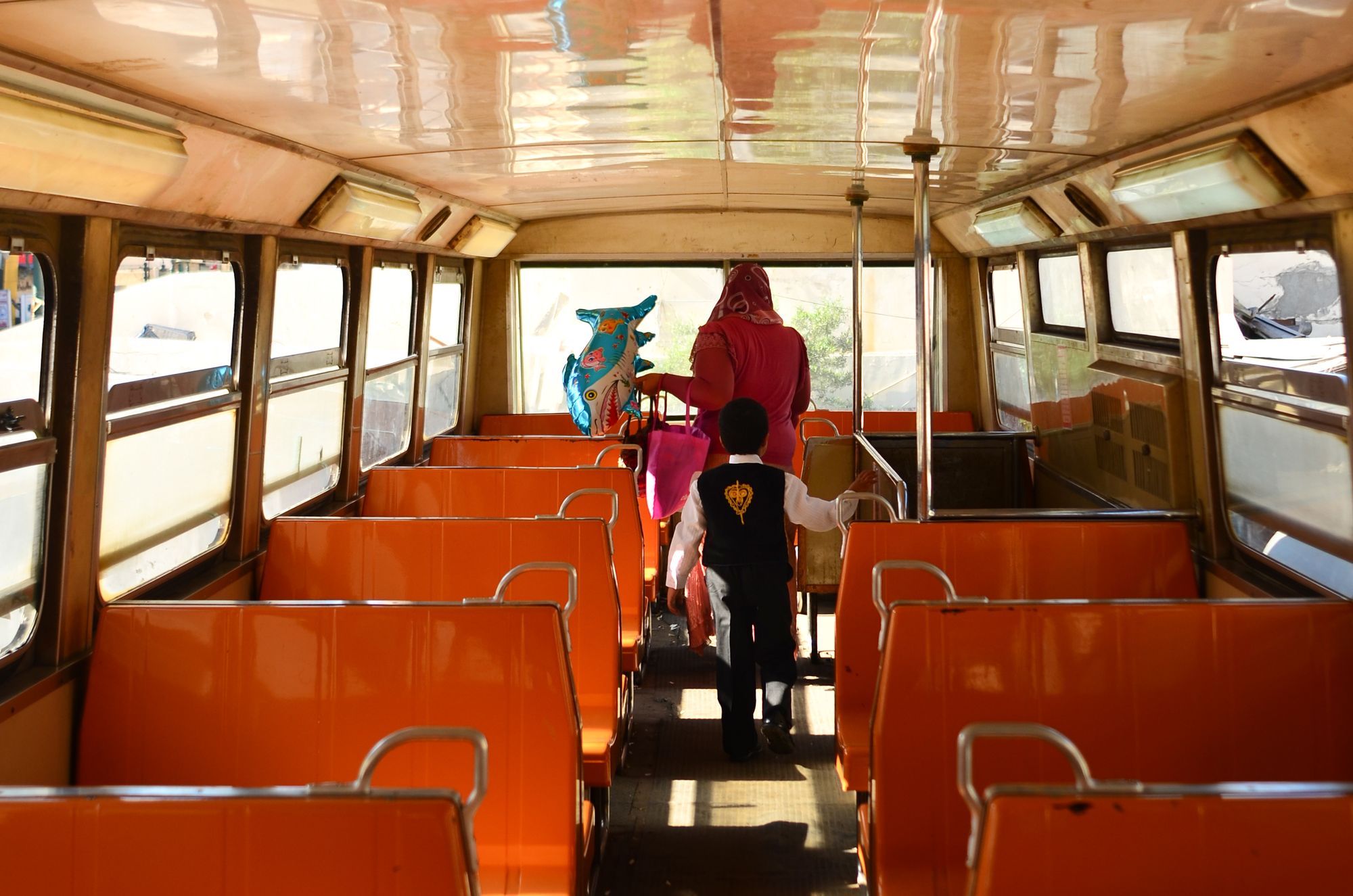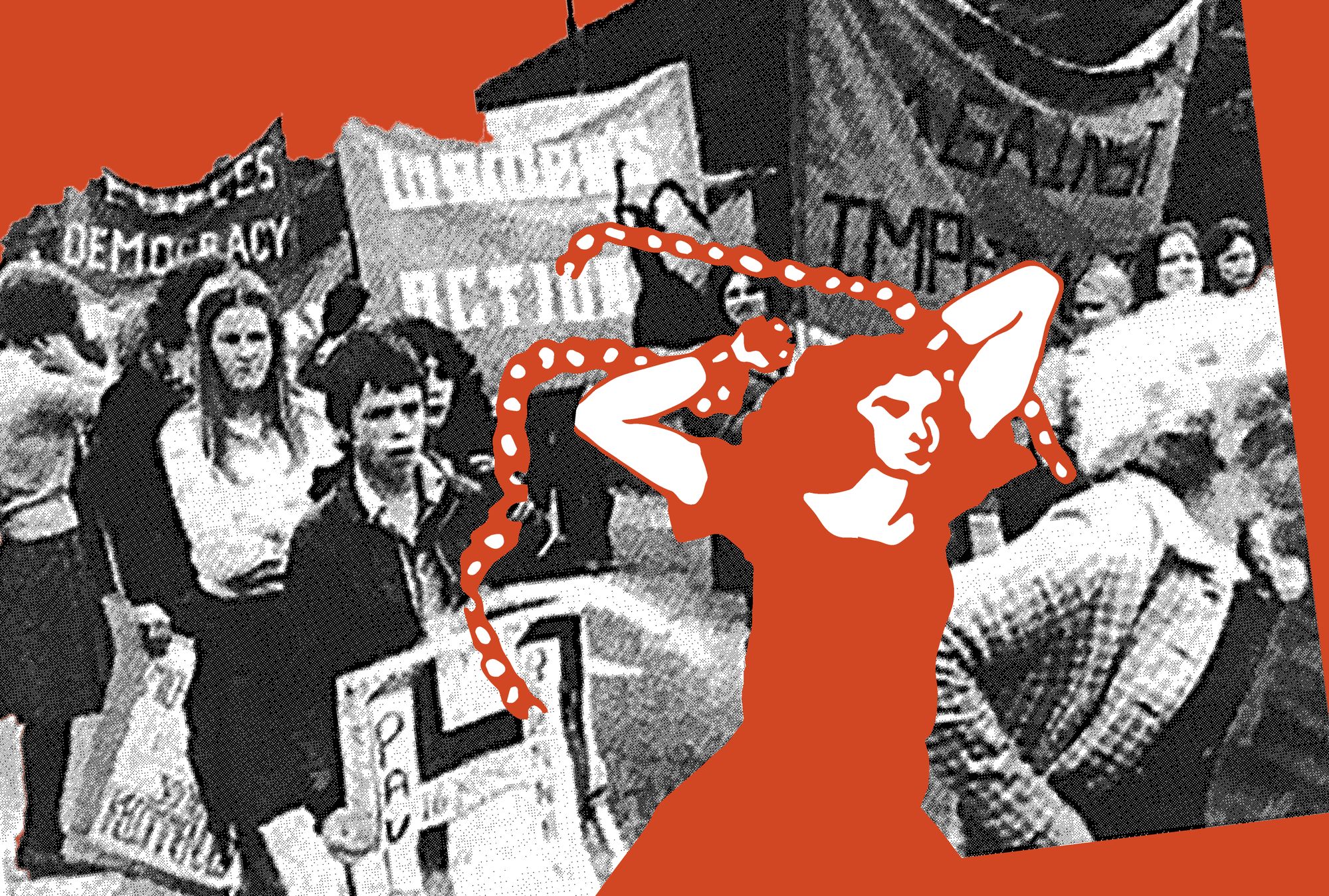
Over the last four years, I have started to unravel my childhood in hopes of learning other knowledge systems, tactics, and histories for collective resistance. I tried to remember when I first doubted why I was being taught a certain history over and over again. Was I seven, celebrating the Queen’s Jubilee, dancing around the maypole decorated with British bunting? Or was I nine, learning about Henry VIII’s tumultuous love life riddled with divorce, beheadings, and death? Or was it in English class at eleven, reading poems from both World Wars, celebrating how white British soldiers “saved the world”? I can trace my education journey through institutions in the United Kingdom, as a quest to unearth feminist and abolitionist histories from home, “Northern Ireland” during “The Troubles.” Within those eighteen years, there were many voids, but I uncovered histories of collective resistance, far from the frontiers of classrooms in these schools and universities, tucked away in plain sight.
A process of silence
I grew up in England to parents on different “sides” of “The Troubles,” the name given to a conflict about Irish unification and British occupation, which took place in the north-east of Ireland between the 1960s and 1990s. I felt little connection to Ireland beyond the Gaelic names that my siblings and I share, which broke the rhythm of the English pronunciation in classrooms, and my dad’s weekly Wednesday Irish folk music sessions practising for cèilidhs, social gatherings with music, dancing and storytelling. The silence of the Irish past was deafening—there were no discussions, no rehashing of experiences, no sharing dear memories or knowledge of Ireland. These were far away from our family dinner tables, our history books and my parents’ beloved BBC Radio 4. This void created in me a thirst to find and explore other silenced histories, such as those concerning Ireland, British colonialism and imperialism; and also, above all else, learning about resistance movements. As a child, I always thought school would be the place where I would be enlightened about these topics. But it wasn’t until later that I realized that these revelations came through lively family discussions and from childhood memories of folk songs.
“There was no mention of topics or themes that really helped me to understand contemporary Britain. [...] Nothing was said of the wealth and extraction from the transatlantic slave trade, nor any mention of the U.K.’s wars waged in my lifetime in Afghanistan or Iraq.”
Silence in education institutions
One day, my secondary school teacher mentioned that at university she studied the history of Ireland and American studies. She suggested that maybe sometime she could teach us about Ireland. Excitedly, I explained I wanted to learn about the history of conflict in “Northern Ireland.” She told me she would ask the head of the department. Eagerly, I asked about it repeatedly for two weeks—only for her to brush me off, which showed me that there are just some things that aren’t discussed. During my teen years, we continued our history lessons, with a curated syllabus filled with Henry VIII and his seven wives, WWI and WWII, the American victory of the Cold War, and the “saints” and “sinners” of the U.S. Civil Rights Movement. But there was no mention of topics or themes that really helped me to understand contemporary Britain. What of the devastating effect of British colonization and the peculiar brand of British racism? Nothing was said of the wealth and extraction from the transatlantic slave trade, nor any mention of the U.K.’s wars waged in my lifetime in Afghanistan or Iraq. It left me wondering why schools’ British history contained only baseless excerpts; was it to shape young minds to feel proud to be British? To curb resistance? I was left feeling both alienated and un-British.
“I felt confused by the state of stagnation in knowledge—education seemed to be ladled out unchanged, without student participation, feedback, or awareness of the times.”
Deterred by tuition’s annual fees of £9,000 but motivated to break the deafening silence of past and ongoing imperialism in the UK education system, I naively believed the grass would be greener on the other side of the channel. I chose a degree in International Studies at the University of Leiden in the Netherlands. By the time I got to university, the gaps in my education overwhelmed me. Despite having had 14 years of education, I could only hear silence. Arriving in the Hague against the brisk sea wind, I quickly found that, similar to the U.K., silences were only ever temporarily interrupted. In my first week, I learnt about Edward Said’s work about Orientalism, then a guest lecture by a former NATO general justifying military intervention to a room of aspiring aid workers and diplomats. A stark reality check I knew all too well from UK schools, lecturers and peers rolled their eyes when I attempted to critique the bachelor degree structure, the reading lists and our examinations. Their attitude was: “Why do you care? You’ve already passed.” I felt confused by the state of stagnation in knowledge—education seemed to be ladled out unchanged, without student participation, feedback, or awareness of the times. Knowledge, at Leiden University, or frankly at any European university, seems to be set in a pre-designed mould, like the stroopwafels sold on the streets of the Netherlands.
My quest to learn about resistance led me to London to the School of Oriental and African Studies (SOAS), originally a colonial training school self-identifying as the leading institution for the study of Asia, Africa and the Middle East in the U.K. This public research university which markets itself as “decolonial” was where I chose to study a Master’s degree in Labour and Movement Organizing. A short honeymoon lasted all of one day, as it quickly became clear that radical resistance was to be confined to reading lists and classroom discussions—not actions that criticize or could jeopardize the university itself. There were modules on resistance celebrating struggles not within the U.K. or European context, but in the majority world. While deportations, institutionalized racism, zero-hour contracts and threats to unionized workers are continually silenced by the university (most recently demonstrated by #firehabib campaign calling out the anti-Blackness of SOAS director Adam Habib). These movements from outside were far removed from the struggle existing within these same university buildings; they were glorified, appropriated and hollowed by the colonial institution for annual tuition fees of over £10,000.
I felt that the knowledge doled out at SOAS often orientated me away from criticizing the institution, and toward an understanding that resistance was located far away—where it was “necessary” because those people and nations had “no rights.” I realized that my classes on resistance tried to make students feel distant from the struggles happening along the corridor—against outsourcing, precarious contracts, and racist university management. It seemed as though courses on resistance within institutions—specifically, within U.K. academia—often co-opts movements for liberation and justice to serve as smoke screens to bury resistance efforts within the same institutions.
“Access to academic books is expensive and papers are often paywalled. So who is research on resistance for?”
I hesitated as SOAS lecturers spoke about intimate details of resistance and movement strategies. Who should be reading and consuming the resistance? Was it supposed to be me or other students? But who else? Access to academic books is expensive and papers are often paywalled. So who is research on resistance for? There are many answers to this question, but the answer that I still remember is the exposé by Decolonising Our Minds Society. This is a student and activist society started in 2015 that fights against racism, borders, profit and exploitation; and also for the overhaul of the curricula, teaching methods, and greater representation of Black, Indigenous, and People of Color across academia. Their exposé, published in 2019, revealed the “Marxist” academics, who were researching and teaching about union organizing in East Africa and political resistance in the Arabic-speaking world, were simultaneously getting paid as consultants for their expertise by the U.K. Ministry of Defence. My resolve waived once I understood who else could be consuming knowledge about resistance. This deep yearning to learn about resistance brought me to this potential wealth of knowledge, but I was idealistic to not think of the way it could be used besides liberation.
After 18 years of education, I had come full circle. I realised that the silences around resistance, for which I had craved for years to uncover and learn, were increasingly being presented in U.K. educational institutions. However, these histories of resistance were seen as sexy and marketable and packaged as objective, static, flat—simply as information for audiences in colonial metropoles. Made lifeless, like the OSPAAAL (Organization of Solidarity with the People of Asia, Africa and Latin America), posters exhibited in a colonizer museum’s white cube, a room with white painted walls usually located in an art gallery or museum to create a “neutral” space for art to be consumed or brought,—a place run by those who would not hesitate to fire their outsourced Latino cleaners on strike.
Reading resistance: the case of “homecoming”
In 2019, I tried to piece together the histories of my family’s non-violent and violent resistance to British occupation and migration. I began at home by borrowing Irish novels from my parents’ shelves, only to discover that most were written by men about alcoholic single mothers. I then moved on to buy gently used single edition, self-published history books about Ireland and British occupation from London charity shops. While reading, I revisited memories of childhood cèilidhs through lyrics from the Irish folk songs I had played on the violin.
“I remained frustrated by the gaping silence. I struggled to believe that, after years of higher education in the U.K., all I was presented with was a flattened history.”
With my Master’s degree, I was now certified in notions of the logic of resistance, or so I thought. I sped through books, but they were all the same—many creating dogmatic binaries of protestor vs. terrorist, men fighting versus women at home, peace versus war, innocent versus prisoner. Despite books being published on Ireland, “Northern Ireland” and the “Troubles,” I remained frustrated by the gaping silence. I struggled to believe that, after years of higher education in the U.K., all I was presented with was a flattened history. The story of the so-called “troubles” and the “peace” in the north-east of Ireland—as told by reputed historians and journalists—felt simplified into a neat equation, like an Instagram infographic explaining the “two sides” of an internal ethno-nationalist conflict of Protestants and Catholics. I just stopped reading. Shaken from the stories and images of violence, I retreated to the silence I’d become habituated to, only momentarily breaking the silence for temporary uncontrolled outbursts, to berate the Brexit sausage pantomimes and British giggles over the Irish border, and to attempt to nuance any discussion by reiterating “one (wo)man’s terrorist is another (wo)man’s freedom fighter.”
Part of this paralyzing suspicion lies with the fact that this is recent history: in 1998, when I was just two years old, the Good Friday Agreement was signed. This shaky agreement from the “Troubles” is still being played out on an uneven playing field: where the British state calls the shots with a plan to grant amnesty to British soldiers. Furthermore, there is the drafting of an official history of the “Troubles,” when official files relating to state decisions and actions during the conflict, including documents on MI5 involvement, are still embargoed. In turn, even though I grew up without a U.K. state-approved official history of the “troubles,” it should not surprise me that I internalized the history of a backward “Northern Ireland” without feminism, anti-imperialism, abolition, and international solidarity.
One day, a good friend of mine, while researching Egyptian labor histories at the colonial U.K. national archives, told me about the May Day Rooms, a radical archive of social movement histories on Fleet Street, housed in a spacious room overlooking the former newspaper street of London. When I entered, I was spellbound. Despite being at a central location, free and welcoming, the existence of this archive was not common knowledge. One might only know about it if, like me, you got tipped off by a friend, or if you worked there or attended activist meetings in the space, as the archive was hidden amidst big businesses and banks in a corporate neighbourhood of London.
When I arrived, I remember browsing and reading feminist, anti-imperialist, abolitionist movements pamphlets from the north of Ireland in the 1970s and 1980s stored in mint green boxes. From the accessibly priced pamphlet series, all under 50 pence—Belfast workers research bulletin, Women’s Action and Banshee, tracing daily resistance. These publications highlighted protests by the many Irish women who stood up against their bosses, prisons, the police, the army, the church and the healthcare system amidst the “Troubles.” They broke the silence I grew up with, and propelled me out of the flat-packed “how to understand the Irish troubles in one book” haze.
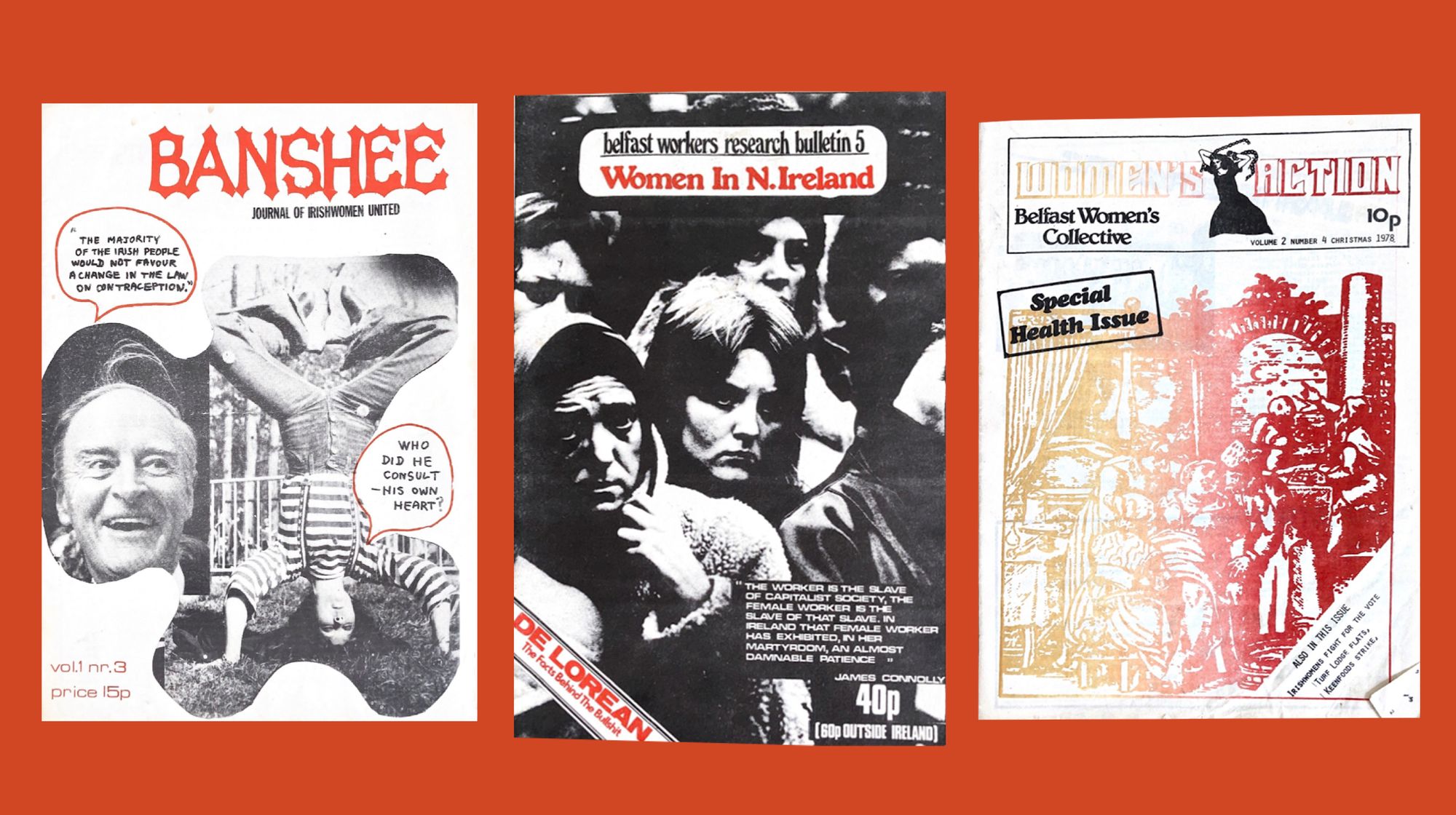
Breaking the silence and listening in autonomous organizing
The first thing that caught my attention with these pamphlets was that they were designed, published and printed amidst army occupation and paramilitary barricades. Each group differed in their publishing approach and were made up of members from all classes, but were autonomously organized. Although members of groups overlapped, they were in stark contrast to the male-centered Irish Republican movement I had read so much about.
The prison resistance by the Irish Republican prisoners during the “troubles” was something I’d always read and heard about. I first encountered it from a PhD student from Gaza, who linked the Palestinian hunger strikes and the Irish prisons. Then I heard it again, at my grandmother’s funeral, at a fleeting mention of a hunger striker in my family. It was one of the few things that had come up in my family’s discussion: how prisons were used to maintain British imperialism and control in the northeast of Ireland. But I had never heard about women in prison and their anti-imperialist resistance during this time.
I was excited when I learnt more about the Belfast Women’s Collective, which was active for three years from 1977 and was born out of the socialist movement. Their pamphlet, Women Action, focused on issues including reproductive rights, childcare and equality at work. They ran articles on autonomous actions such as the women-led workers strike at Keenfood in the winter of 1978. The strike was initially without the support of their union—the Irish Transport and General Workers’ Union—and was organised by 30 women who set up a 24-hour picket line. Protesting general working conditions and management’s productivity requests, this strike, like the physical object of the pamphlet itself, gave me a sense of hope in the possibility of autonomous daily organizing.
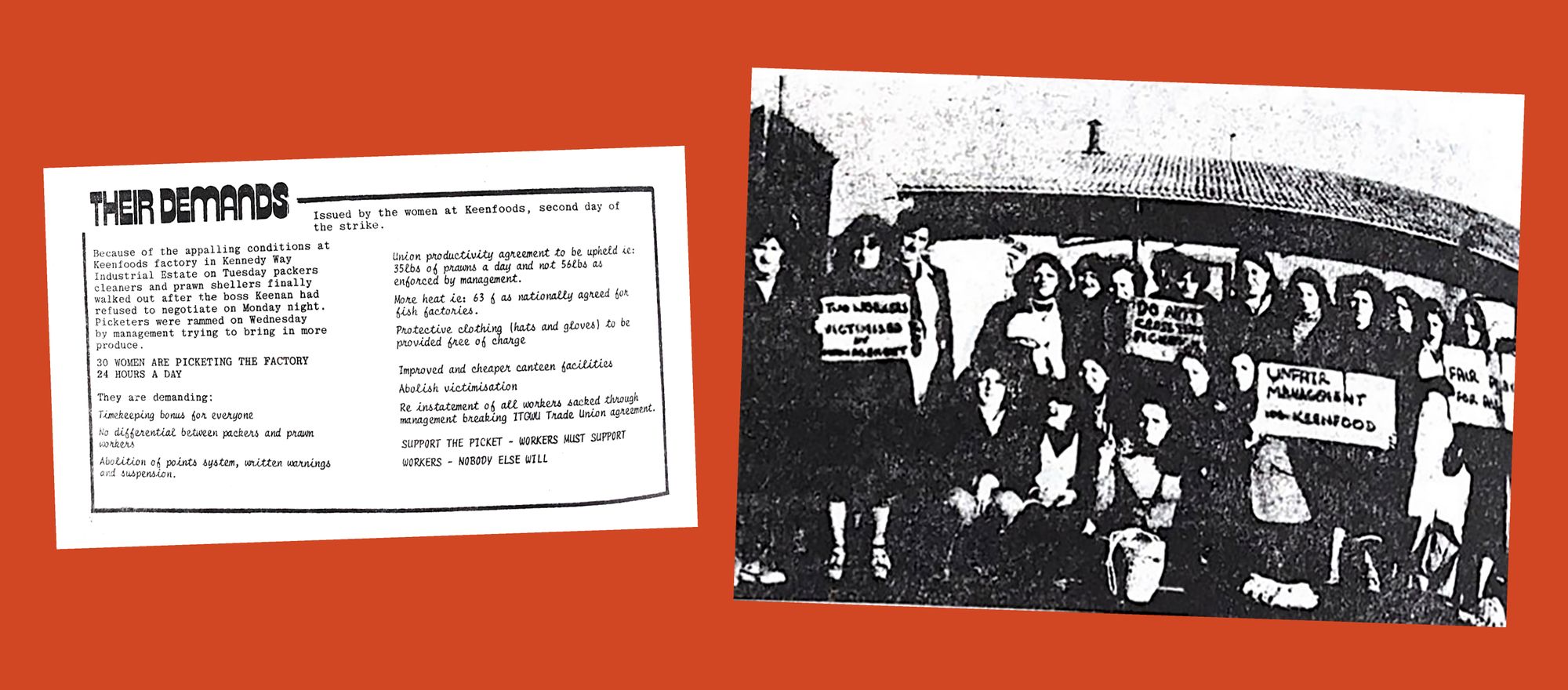
In the May Day Rooms, I discovered Women Against Imperialism (WOI), listed in the fifth Belfast Workers Research Bulletin. A small collective of working-class women was active from 1978-1981, based between Belfast and Derry; they were connected through shared experiences of routine daily harassment and intimidation by the British Army in their neighborhoods. They became known for leading an annual protest on 8th March, International Women’s day, outside the only women’s prison, Armagh, calling out the prison system as part of British imperialism and as a feminist issue.
In the late 1970s, all but one woman imprisoned in Armagh were locked up on political charges or interned. Throughout this time, the British state changed rules about prisoners’ political status. Political status issued before March 1976 ensured certain “privileges” such as extra letters, more prison visits and no prison work. These changes triggered the action; most famously the no-wash protests and the world-renowned hunger strikes in Armagh and Long Kesh throughout 1980. During this time, the WOI made visible the conditions for women prisoners through reporting, organizing picket lines and creating pamphlets to educate and bring awareness. Their March 1980 pamphlet exposed the plight of women prisoners’ lack of access to healthcare; this issue was dedicated to Pauline McLoughlin, a no-wash prisoner who was directly affected by these issues.
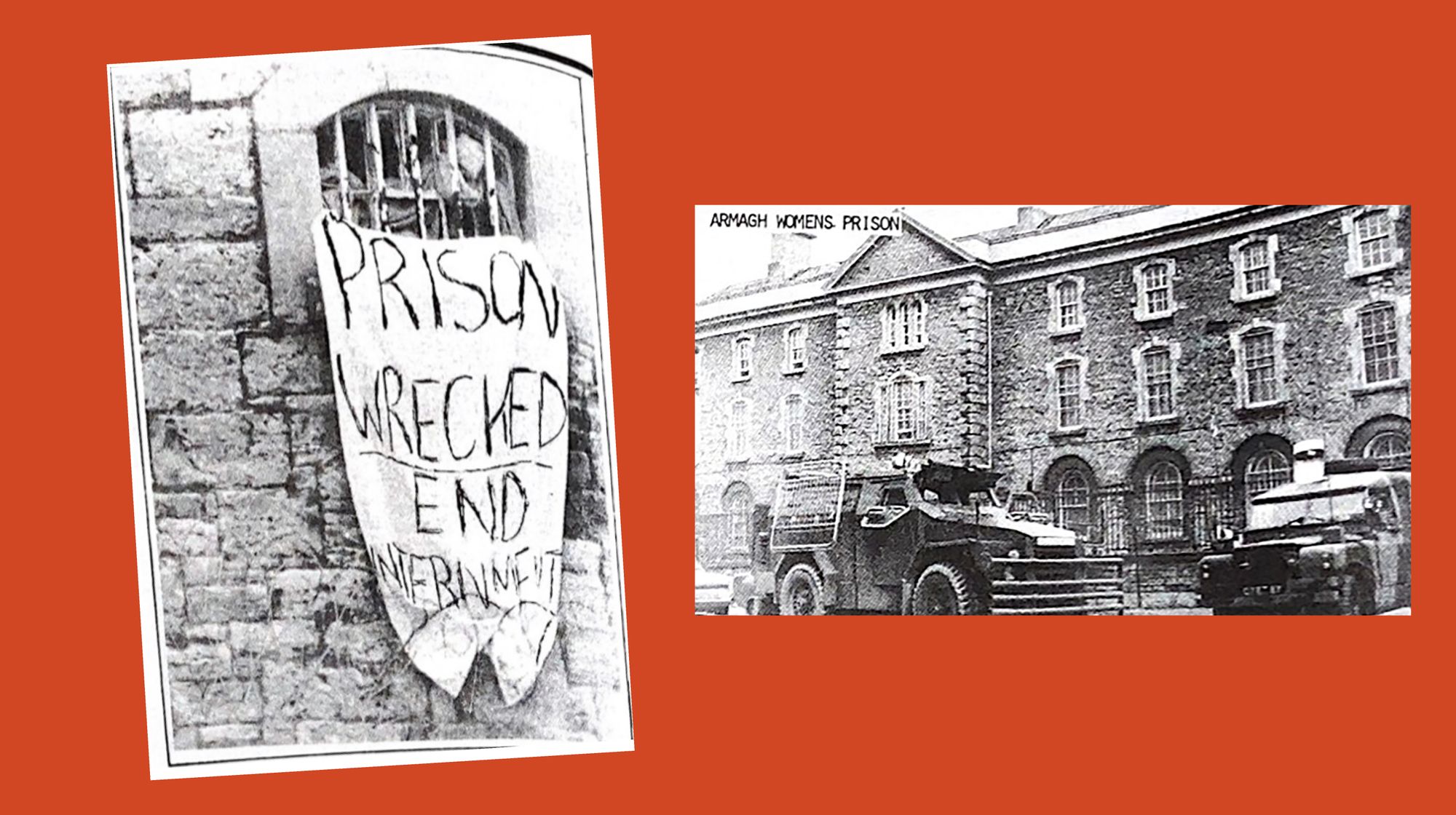
Webs of resistance and flattening institutions
The discovery of the pamphlets at the May Day Rooms not only fuelled my excitement of histories of autonomous feminist organizing in the streets, prisons and workplaces, but it served as a reminder that histories of resistance are webs of different overlapping groups, ebbing away at different parts of state power. Reading them 40 years later, I was thrilled to widen my understanding of those who organized and waged resistance in prisons and beyond in the north of Ireland during this time. I know, however, that isolating these pamphlets of feminist resistance from wider political organizing in the north of Ireland would risk becoming a new form of flattening history, and an erasure of the intentions of those who resisted in the first place. Instead, these pamphlets helped me to read feminist organizing in wider landscapes of interconnected resistance, to pluralize history and refuse the flattening of history to single actors or groups. Understood together, this broad web of Irish feminist organizing gave me a powerful sense that not all resistance can be shared through history books. Some histories are alive and well—on the streets, in our neighbourhoods, and at our workplaces; as they are experienced collectively, this is also how they should be shared.
“Some histories are alive and well—on the streets, in our neighbourhoods, and at our workplaces; as they are experienced collectively, this is also how they should be shared.”
After this winding journey, I learnt that the silences of educational institutions will not be broken simply by the inclusion of resistance in school or university curriculums. The last shred of hope faded when Boris Johnson, the UK prime minister, announced the UK government’s plan to write an official history of the “Troubles.” In the UK, it seems as if histories of resistance will continue to be flat-packaged for pricey “decolonized” university degrees, especially when it is continually robbed of all meaning and deactivated of intent to become another cog in the machine—a machine built to silence the facts and experiences of slavery, colonialism, imperialism, exploitation, and extraction as the foundation of the British colonial empire. Thus there is a need for the silence scattered across European educational institutions to be the pillar to uphold the power and privilege of the empire. To break this silence would require full-scale destruction, but even if it means dismantling it, wall by wall or brick by brick, the myopic perceptions and carefully curated curricula of the UK education institutions must fall.
With thanks to May Day Rooms Archives for access to the pamphlets.
Gráinne Donohue (she/her) is a feminist researcher and organiser based in Marseille. Gráinne’s research, writing and organising centres abolition, ending: prisons, deportations, detention centres, and borders; fighting: precarity and corporate profit; and building renters and workers’ rights, transnational solidarities, and political education.
Title image: Collage of images from the Belfast Workers Research Bulletin No. 5.: Women in N.Ireland. The photograph is footage from a march by Women Against Imperialism, the image on the right is the logo for the Women Action.
This text was produced as part of the Against the Grain Fellowship.


